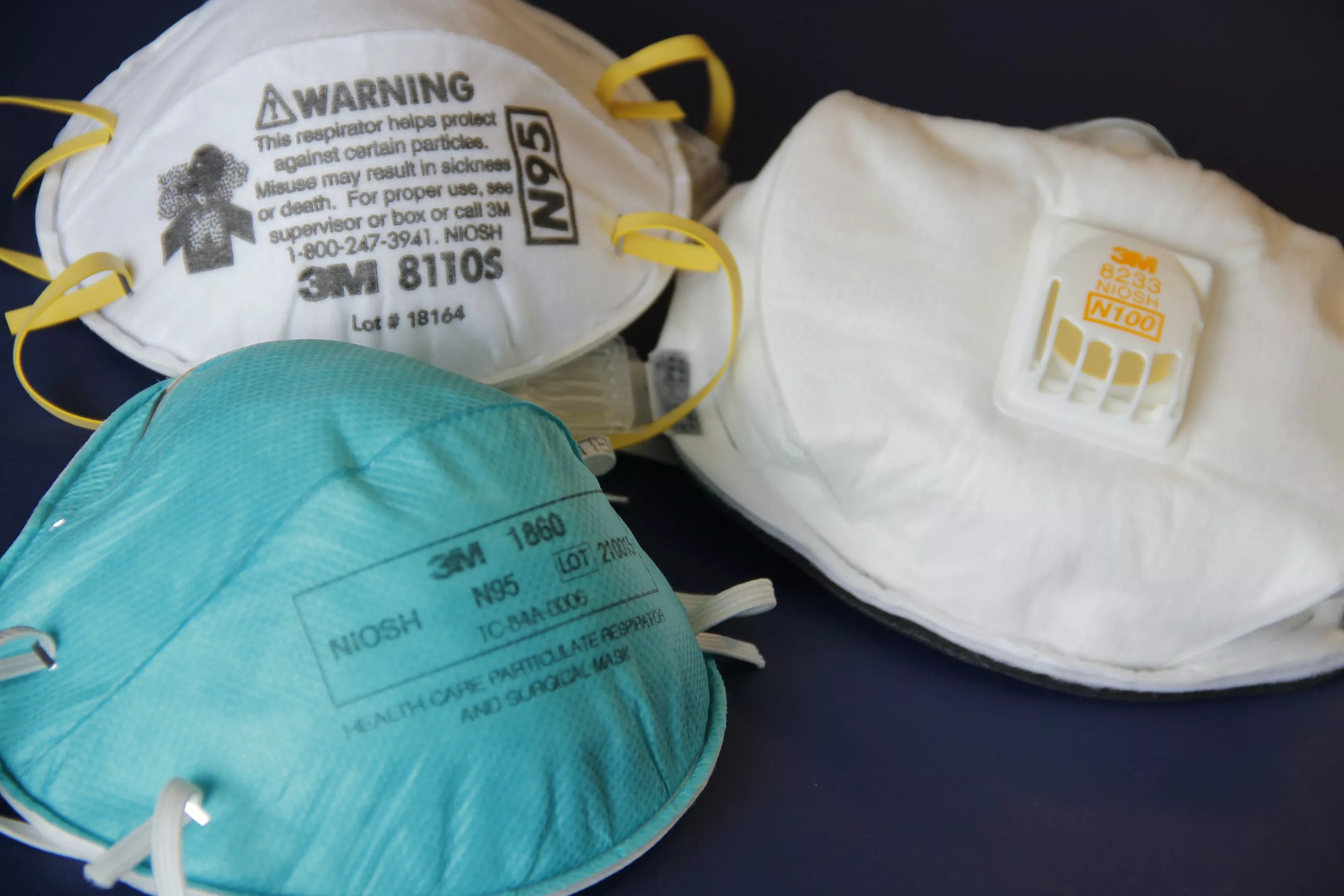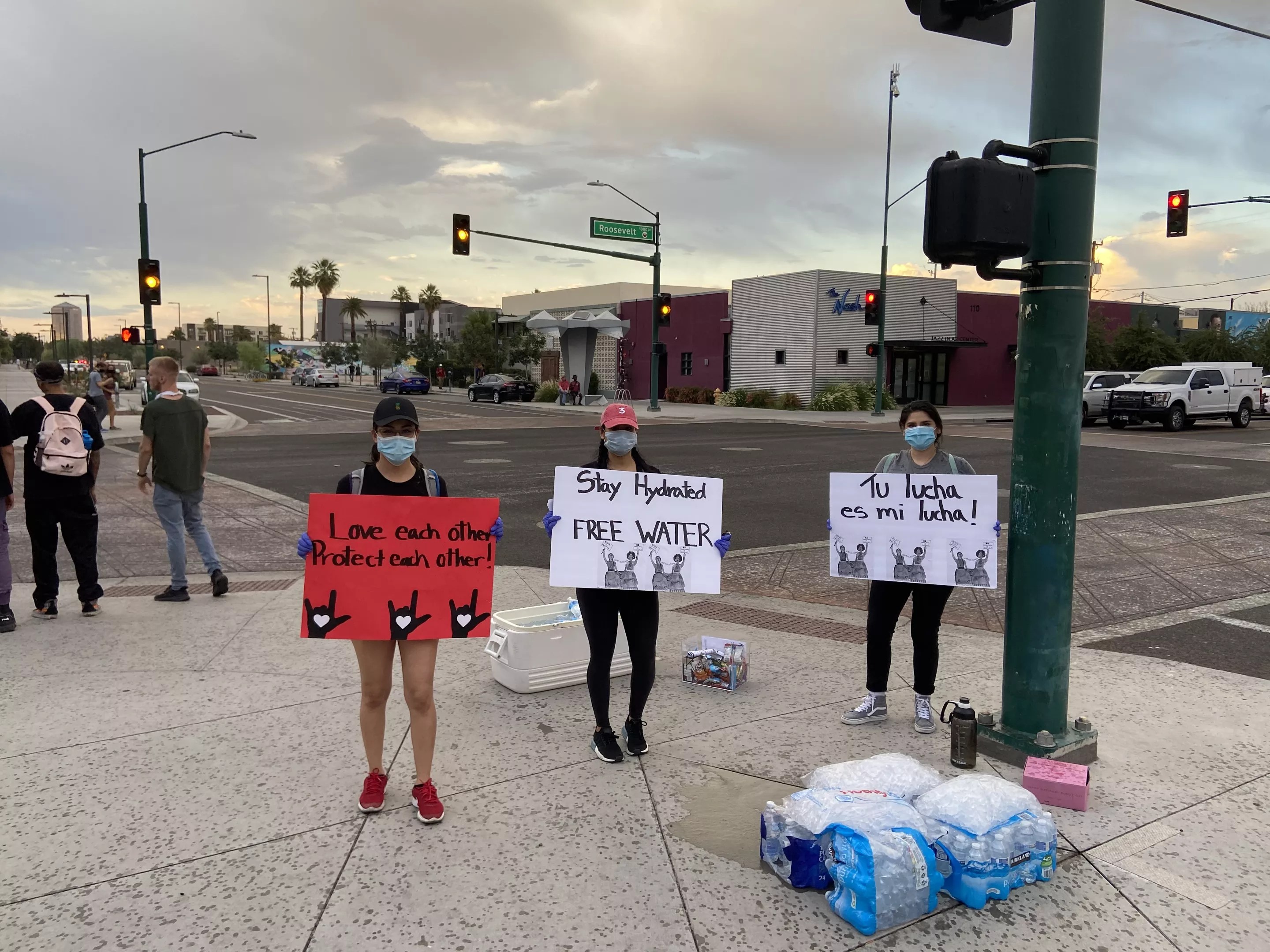

Audio By Carbonatix
Arizonans are a special breed. Our state is the final frontier of the Lower 48, and we tend to find it particularly detestable when told what to do by the government. That extends to wearing masks during a plague. Just because the rest of the world is wearing masks doesn’t mean Arizonans will. A troubling spike in COVID-19 infections here hasn’t seemed to sway many, either.
Lately, some local institutions have moved in the direction of encouraging masks. On Friday, Arizona State University President Michael Crow announced that the school would be requiring masks indoors on campus and outside where social distancing isn’t possible. And Maricopa County public health director Dr. Rebecca Sunenshine admitted this week that, though she hadn’t previously been wearing masks on a routine basis, her mind has been changed on the subject in light of new scientific evidence that shows masks prevent the spread of COVID-19.
Yet Arizonans aren’t clamoring for a mask mandate that would give police another reason to stop them, nor has Governor Doug Ducey given any indication he’ll order residents to wear masks.
The known number of cases has gone up about 70 percent in Arizona since the first of June, from about 21,000 cases to more than 35,000, and the number of deaths due to COVID-19 has increased by more than 25 percent, to 1,186 as of Sunday morning. Would more mask-wearing really help?

Steffan Eikenberry and Abba Gumel
ASU
Phoenix New Times turned to two experts from ASU’s School of Mathematical and Statistical Sciences to answer questions Arizonans might have about masks and their wearing.
Foundation Professor Abba Gumel and Post Doctoral Scholar Steffen Eikenberry recently led a team of six other experts to analyze the effectiveness of masks, producing a study published in the latest issue of the scientific journal Infectious Disease Modelling. Titled “To mask or not to mask: Modeling the potential for face mask use by the general public to curtail the COVID-19 pandemic,” the study concludes that mask-wearing by the general public has “high value” in curbing disease.
Below are the questions and answers. Eikenberry’s answers are edited from an interview on Friday; Gumel’s full emailed responses are included.
1. Do masks actually work to slow disease transmission?
AG: Absolutely. This is evident from the very small number of COVID-19 cases in some Asian countries (per million people), such as China, Singapore and South Korea, where people are used to wearing face masks whenever necessary.
SE: The short answer is yes, almost certainly. There’s multiple lines of evidence to suggest they slow transmission… From our model, it’s better to have more people wear low-efficiency masks than less people wearing higher efficiency masks.
2. Could a lack of widespread mask-wearing in Arizona have helped cause the spike in cases this month?
AG: Yes. But the spike may also be due to other factors such as the increased COVID-19 testing done in Arizona and the increased community contacts (and not-strict observance of social-distancing) after the partial lifting of lockdown measures on May 15, 2020.
SE: Obviously it’s hard to say, exactly… I would strongly suspect that yes, that plays a role. If more people were wearing masks in public, then yes, that could have helped. [Eikenberry reiterated it’s just his opinion.]
3. If I’m not infected but am wearing a mask while talking face-to-face with someone infected with COVID-19, do I get any benefit?
AG: Yes. This will prevent you from getting infected due to the casual droplet from the infected person and from touching your face.
SE: That’s one thing that irks me a little bit, this messaging that it’s almost entirely to prevent you from spreading it to other people. Evidence clearly supports the role of masks in also protecting the wearer from getting the disease… And you don’t know if you don’t have [the disease], really. So either way, you should wear one.
4. Do people touch their faces less while wearing masks?
AG: Yes. You will end up touching your face mask instead.
SE: Humans are basically like little rodents. We constantly touch our face… Once you have a mask on, you are very conscious of it. Anecdotally, it dramatically reduces how much you touch your face.
5. What if I really hate wearing a mask?
AG: Then try to maintain social/physical distance (of at least 6 feet from other humans in public) and only wear it if there are people not wearing a face mask within 6 feet.
SE: Uh, I mean, you gotta assess your values – what you think is important. If doctors can do it all day long, you can probably do it for a few minutes inside a store.
6. What if I feel wearing a mask is an infringement on my individual identity?
AG: Then, do not feel that way. Get used to it. You are helping to not only keep yourself healthy but also contribute in reducing community transmission. You may be saving lives!
SE: I kind of get that. I would say, in Arizona, you’re not mandated to wear masks. I can understand how you might bristle at these kinds of things. But reorient your thinking… If you accept the fact that [masks work], you should just do it for that reason, not because you are being told to do it. It’s a heartless conception of freedom: ‘You told me to do it, so I’m not going to do it, even though it has real consequences for people.’

David Hudnall
7. Am I sending a political signal just by wearing a mask?
AG: Not at all. You are sending a signal of being responsible and a good and caring member of the community. COVID-19, like all other diseases, is no respecter of politics.
SE: No.
8. Will I look weak/stupid/ugly in a mask?
AG: No. It makes you appear to be responsible. Hence, respectful.
SE: I personally appreciate it when other people are wearing masks. They are being considerate of people around them, in my view. In terms of looking weak – does wearing a seat belt make you look weak? [Eikenberry agrees that it might be uncomfortable to be the only person in a store with a mask on, and recalls once how “people gave me a look.”] But whatever, you know, who cares? You’re never even going to remember this, and it sets a good example.
9. What should I do if someone who’s not wearing a mask suddenly gets up in my (masked) grill?
AG: If possible, politely move away or point to that person about the signs to maintain the social distance.
SE: I’d try to just diplomatically back up or something. Again, your face mask is certainly helping to protect you, but you should not want their droplets right in your face.
10. Should I ever admonish a store employee or fellow citizen, even gently, for not wearing a mask?
AG: Sorry that this would be a somewhat lengthy response. Ideally, everyone should be strongly encouraged to wear a face mask in public. Depending on how receptive they may be, one can attempt to suggest. I generally would not, unless I know them personally. There may be reasons why they are not wearing face masks, including health reasons (there are numerous legitimate health reasons that make it impossible for some people to wear a face mask) or that they have already acquired, and recovered from, the pandemic (and feel that they are immune from future infection).
SE: It’s a philosophical or social question as much as a scientific one. I don’t know. If you could do it with good humor, where people don’t automatically get defensive, maybe it’s reasonable. You can’t tell people you’re killing people. It’s human nature. They’ll get defensive.
11. Is it okay to leave my nose showing while wearing a mask?
AG: No. But it is OK if there is no one within 6 feet.
SE: No. Please cover your nose.
12. Should outdoor joggers and cyclists be wearing masks, too?
AG: I think it is OK [not to wear one in those circumstances] if one can maintain a distance from others at least 8 feet.
SE: [Not wearing is acceptable] as long as you’re by yourself, you’re outdoors, you’re not placing anyone or yourself at risk. In general, outdoors is always safer [except with a group or when near other people]. If I was going to be in a pack of people, like a pack of runners, I’d wear a mask.
13. Should I leave my mask on if eating indoors at a restaurant when not actively eating/drinking?
AG: Yes.
SE: That’s one of those ‘practical’ questions: How practical is it to take it on or off? Personally, I’m not eating inside at a restaurant… I would not recommend eating indoors.
14. Will leaving my mask in the sun in my car in Phoenix this summer kill any germs on it?
AG: I think so. I believe the number of germs (if any) will be so low it will not survive under the AZ sun for more than a few minutes since the virus is coated with an extremely thin fatty membrane that will start melting in temperature over 86 degrees Fahrenheit (see here).
SE: If you leave a mask in a hot car in Phoenix, there is some data to show [the heat kills germs.] I leave it in the car… it’s been baked at 130 degrees.
15. Should I open my door to people wearing masks?
AG: Yes, with the usual caution of course. Criminals wear different masks, which cover more than just nose and mouth.
SE: I mean, use your judgment. Maybe ask who it is first.
16. Does wearing sunglasses or eyeglasses with the mask provide extra benefit?
AG: I think so.
SE: It may help a small amount, but most of the benefit is going to be from the mask.
17. What are the best types of masks to wear for protection, if I can’t get N95s?
AG: In almost all practical situations, any multiple-layer face covering will be fine.
SE: If you’re doing a tightly fitted cloth mask, it could potentially be better than a surgical mask… Cotton and silk would be a quite effective mask.
19. I found some N95s in my shed – is it okay to wear them out, or am I hoarding supplies that hospitals need? Should I donate them to a hospital?
AG: These masks are rightly reserved for frontline healthcare workers. Members of the general public should use medical or even cloth masks instead (so that we do not create scarcity of these masks in the hospital system).
SE: If they were unused, the hospital may take them. But if they’ve been open and used, I’d be shocked if they took them.
20. If N95s are the best and might prevent community spread more effectively, why can’t average consumers find them?
AG: You can find them. However, we stress that owing to the scarcity of these masks, we really must prioritize the healthcare workers.
SE: I’m wondering the same thing.